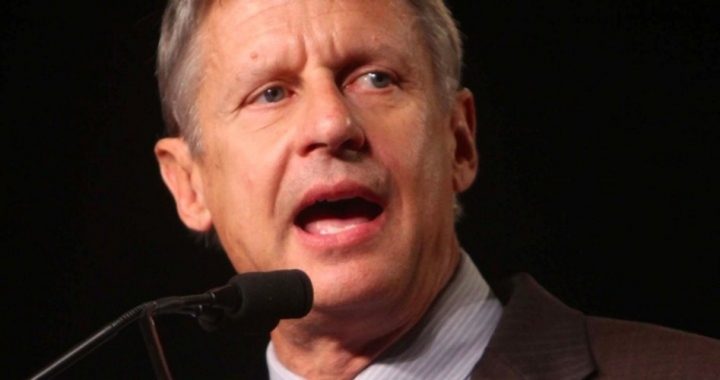
Libertarian Party presidential candidate Gary Johnson filed suit last Friday in federal court in Washington, D.C., claiming that he meets the criteria set by the Commission on Presidential Debates (CPD) for inclusion in tonight’s presidential debate.
Johnson’s campaign argues that he has earned “more than 40 percent of the vote in head-to-head polls against President Barack Obama.”
The CPD is a joint venture of the two major political parties, created in 1987 to establish the rules for the management of presidential debates.
In a statement posted on the campaign’s website, Johnson campaign attorney Alicia Dearn makes the case for Johnson’s inclusion in Monday’s event, the final debate between the two major-party candidates scheduled before Election Day.
“The CPD requirements say Johnson ‘must register support of at least 15 percent of the vote in five recent polls,’” Dearn said. “Nowhere does it say those polls must include three candidates. Indeed, the polls used by the CPD to exclude Johnson test only two candidates even though Gov. Johnson is on the ballot in 48 states. We argue that Gov. Johnson has met the specific and narrow criteria laid out by the CPD.
“Included in the two-party ‘deal’ struck by the Republicans and Democrats are the criteria by which candidates are invited to participate. As a two-term governor who is on more than enough states’ ballots to be elected in the Electoral College, the decision to exclude Gov. Johnson can only be based upon the CPD’s self-determined polling criterion — using polls that are ‘head-to-head’ surveys between Romney and Obama.”
Although it is unlikely that the two major political parties would allow their own creation to be used to challenge their electoral hegemony, perhaps the rules they established could be used to that end in an unbiased court of law.
According to the guidelines set out on the official CPD website:
Those candidates qualify for debate participation who (1) are constitutionally eligible to hold the office of President of the United States; (2) have achieved ballot access in a sufficient number of states to win a theoretical Electoral College majority in the general election; and (3) have demonstrated a level of support of at least 15 percent of the national electorate, as determined by five selected national public opinion polling organizations, using the average of those organizations’ most recent publicly-reported results.
There is no argument that Governor Johnson meets the first criterion. The same, ironically, cannot be said about Barack Obama, however. There are serious unanswered questions regarding President Obama’s constitutional qualifications to be president, specifically the requirement in Article II of the Constitution that a president be a “natural born citizen” of the United States. Even assuming Obama was born in Hawaii, the fact remains that his father was not an American citizen.
The Johnson campaign, however, does not hang its hat on that issue. Instead, the Libertarian Party candidate points to the third prong of the CPD test.
In defining the Johnson campaign’s interpretation of that criterion, Dearn said in her statement:
The CPD rules do not specify the number of candidates to be tested in the poll. Using their own methodology, polls that ask voters’ preferences between the President and Gov. Johnson are equally valid, and as we have demonstrated, will show more than enough support for Gov. Johnson to meet the CPD’s arbitrary 15 percent requirement. The same would clearly be the result when Gov. Johnson is surveyed against only Gov. Romney. Nowhere does it say that only the Republican and the Democrat should be pitted against one another.
A plain reading of the CPD criteria supports Dearn’s contention. Although a creature of the two parties, the four corners of the agreement that created the CPD contain no restriction on the participation of a representative of a third party.
There is precedent for the participation of a third party candidate in debates sponsored by the CPD. Ross Perot, running as an independent, shared the stage in 1992 with Republican George H.W. Bush and Democrat Bill Clinton.
In the early months of the 1992 campaign, Ross Perot’s candidacy was third-party in name only, as he polled ahead of his two challengers. In a telephone poll conducted in early June 1992, Perot polled at 39 percent support, Bush came in at 31 percent, and Clinton finished third with 25 percent.
While Perot’s position as a third-party candidate who was invited by the CPD to participate in the presidential debates helps Johnson’s cause, his poll numbers aren’t up to the standard set by Perot.
A look at a few recent polls shows that Johnson’s support numbers top out at about six percent in a three-way race. In a poll that includes the Green Party candidate Jill Stein, as well as the Constitution Party candidate Virgil Goode, Johnson’s numbers decrease significantly.
While the Johnson campaign’s assertion that nowhere in the CPD rules is there a requirement that a candidate poll above 15 percent in a three-way poll, it is equally true that in a survey inclusive of all presidential candidates, Johnson’s case for participation in the debates is weakened, ironically by inclusion of candidates from parties other than the big two.
Dearn responds to these figures, arguing that Johnson’s numbers in a one-on-one contest with Barack Obama should be counted and should be sufficient to push him above the 15 percent threshold.
When Johnson filed his suit Friday, there was little hope that the federal judges would rule on Johnson’s complaint in time for him to be granted stage space Monday night. The issue will not be moot, however, as in his complaint Johnson seeks a permanent injunction asking the court to order the CPD to change its qualifying criteria. This would, Johnson’s campaign claims, fix the problem for “future elections to correct the organization’s fundamental unfairness.”
Photo of Gary Johnson: AP Images



